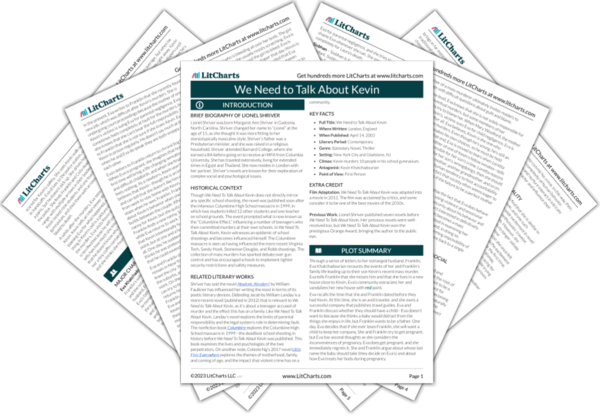We Need to Talk About Kevin follows Eva, whose son, Kevin, has recently murdered 10 people at his school, as she struggles to understand what caused Kevin to commit an act of such brutal and senseless violence. Eva considers both sides of the classic debate about the importance of nature and the importance of nurture. She considers the possibility that Kevin was simply born hateful and evil (nature), as well as the possibility that his upbringing and environment caused him to eventually act maliciously (nurture). Eva believes, and Kevin admits, that at the core of his crime is his desire for recognition and attention. Eva also believes that part of Kevin’s motive is to exact revenge on her for not loving him, and many members of Eva’s community believe that her bad parenting influenced her son to commit murder. These motives support the “nurture” side of the debate, and Eva accepts her role in the tragedy of Kevin’s life. She has let Kevin down in some ways, and her lack of genuine affection toward her son results in Kevin becoming cold and hateful.
On the other hand, there is also evidence backing the “nature” side of the argument. It’s true that Eva doesn’t fully love Kevin, but the novel plays with the idea that perhaps some of Kevin’s innate qualities make him unlovable to her. In fact, Eva and Franklin’s second child, Celia, is the opposite of Kevin in every way, even though she grows up with the same parents in the same environment as her brother. In fact, Eva thinks she can sense both her babies’ respective core energies even before they’re born, when they’re still in the womb. The novel thus presents evidence for both sides of the nature vs. nurture debate, leaving readers with the unsettling possibility that there are no easy answers when it comes to understanding the origins of violent behavior. Instead, We Need to Talk About Kevin suggests that Kevin’s upbringing and his innate personality contributed to his choice to commit his crime. In this way, then, the novel underscores the complexity of human behavior, suggesting that both nature and nurture interact in intricate ways to shape a person’s character and influence their behavior.
Nature vs. Nurture ThemeTracker

Nature vs. Nurture Quotes in We Need to Talk About Kevin
“It’s very dangerous,” I said. Indeed, just about any stranger could have turned up nine months later. We might as well have left the door unlocked.
You can blame your mother, and she can blame hers. Leastways sooner or later it’s the fault of somebody who’s dead.
A poor substitute for the sort of passion we like to extol perhaps, but real love shares more in common with hatred and rage than it does with geniality or politeness.
In Kevin […] the color was a pulsing, aortal red, and the feeling was fury…the paint in his foreground would gradually thicken, its hue coagulating to the sluggish black-purple of liver […]. Yet when Celia slid to hand. […] her aural color was light blue. I was overcome by the same clear-skied azure that had visited me when we made love.











